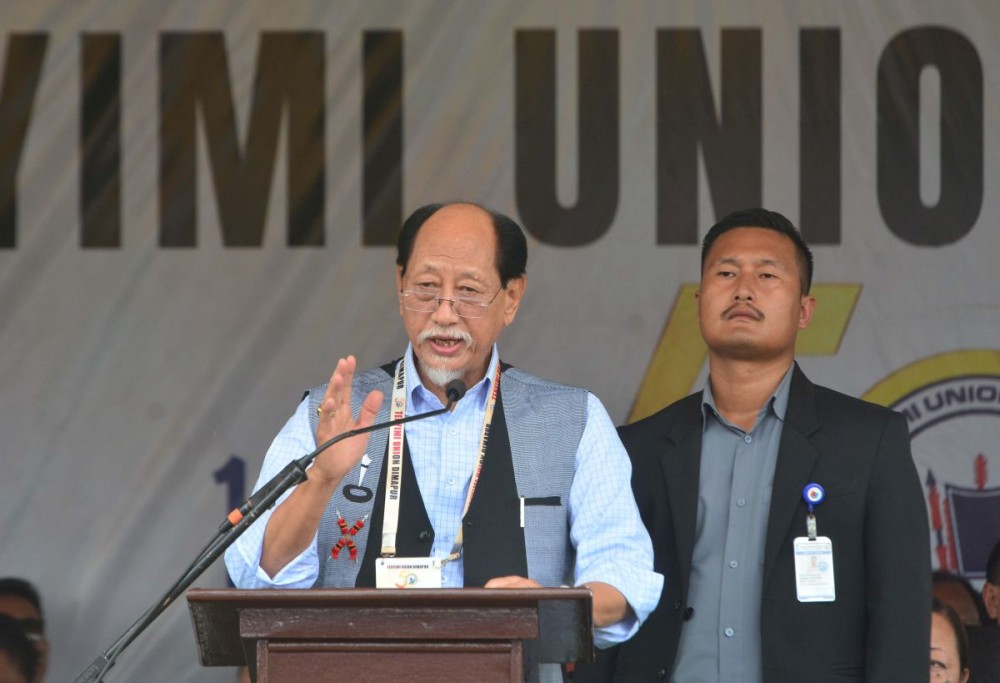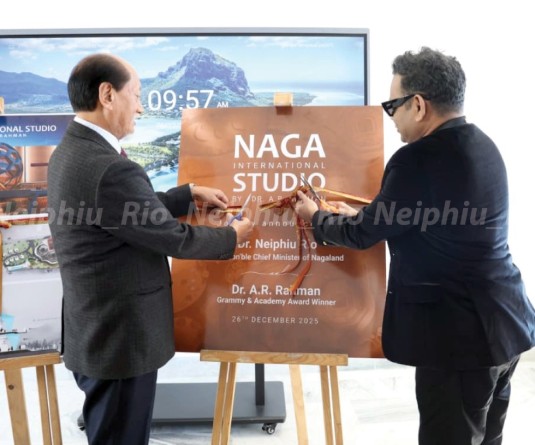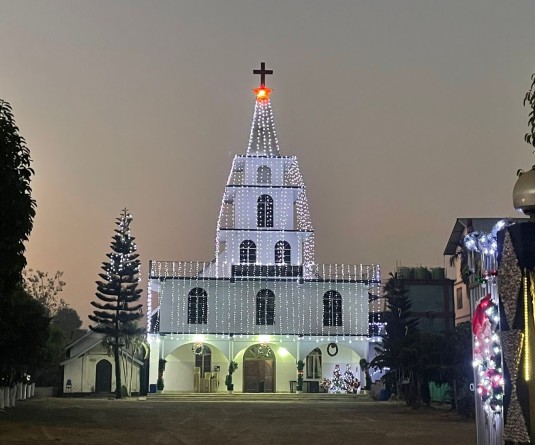Nagaland Chief Minister Dr Neiphiu Rio addresses the Golden Jubilee celebration of programme of Tenyimi Union Dimapur held at DDSC stadium on November 5. (Morung Photo)

Morung Express News
Dimapur | November 5
Nagaland Chief Minister Dr Neiphiu Rio today stated that the time for Naga-ism has come, emphasising that the spirit of unity, integrity, and mutual respect must remain the benchmark, and that the Naga people must rise above individualism, clanism, and tribalism.
“Whether it is the Eastern Naga Peoples’ Organisation, Central Naga Tribes Council, Tenyimi Union Nagaland, or our Naga brothers and sisters in Assam, Manipur, Arunachal Pradesh, and beyond, we must all strive to resolve our common issues-both among ourselves and with others- through dialogue, understanding, and unity,” he opined.
Speaking as the chief host of the golden jubilee celebration of the Tenyimi Union Dimapur (TUD) at the Dimapur District Sports Complex (DDSC) Stadium on Wednesday, CM Rio reiterated that unity has always been the Naga’s greatest strength and stressed that ‘ism’ should never hinder their shared aspirations.
To this end, he called for moving forward with determination, conviction, and compassion toward reconciliation, unity, and oneness.
CM Rio underscored that the Golden Jubilee celebration was a clarion call for the Naga family to unite and move forward as one.
Indigenous inhabitant issue
Meanwhile, he maintained that the issuance of Indigenous Inhabitant certificates to the four Non-Naga tribes, namely Kukis, Kacharis, Garos, and Mikirs (Karbis), was “not correct.”
While acknowledging the Constitution (Nagaland) Scheduled Tribes Order, 1970, he pointed out that the four tribes cannot be regarded as ‘indigenous inhabitants,’ although they may be permanent residents or citizens of Nagaland.
“By way of comparison, just as the Native Americans are considered the indigenous people of the United States, the Maoris of New Zealand, and the Aboriginals of Australia, the same principle applies in our context,” he maintained.
In this connection, CM Rio further asserted that while members of these tribes and their direct descendants are entitled to receive ST certificates, this entitlement applies only to those who had settled within the boundaries of Nagaland before the State was created on 1 December 1963.
He justified that this distinction was important because these four tribes also live in other Northeastern States, many bordering Nagaland, with the majority of their population residing outside the State.
The Chief Minister further alleged that over the years, there have been instances of movement of people from adjoining states, leading to possible cases of erroneous issuance of ST certificates.
On enumeration exercise
To address what he termed a “sensitive issue,” he said that the State government decided to conduct an ‘Enumeration Exercise’ to identify individuals and direct descendants of the four Non-Naga tribes settled in Nagaland before statehood.
He further maintained that the exercise was initiated following thorough examination and consultation, and also in consideration of the findings of the Register of Indigenous Inhabitants of Nagaland (RIIN) Commission.
The intent of the exercise, he further held, was to ensure that all genuine indigenous inhabitants of these communities rightfully receive the Indigenous Inhabitant Certificate (IIC) or Permanent Residential Certificate (PRC) and enjoy all the rights and privileges due to them as citizens of Nagaland.
Dwelling on the protection and regulation of indigenous rights, CM Rio also emphasised that the effective implementation of the Inner Line Permit cannot rely solely on government agencies. It requires the active cooperation of civil society organisations, student union bodies, community leaders, and every vigilant citizen, he said. “The ILP is not merely a regulatory tool — it is a shared responsibility to safeguard our unique heritage and protect the future of our Indigenous people.”
CM Rio further stated that the Home Department has issued comprehensive and updated guidelines to streamline the issuance and monitoring of ILPs, including authorising village councils to maintain separate registers of ILP holders residing in their respective villages.
At the same time, he said that Nagas must seek a balanced policy framework that preserves cultural identity, enables economic opportunities, and provides sustainable growth.




.jpg)

